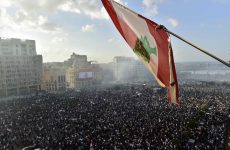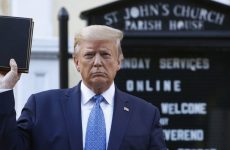On Sunday morning, some of America’s pastors made no mention of the horrific mass shootings in El Paso, Texas, and Dayton, Ohio, that killed at least 31 people and injured dozens more over the weekend. Other Church leaders, however, knew they could not ignore the events.
“Our pulpit is not one that silence works in,” Jason Morriss, the pastor at Austin New Church, a progressive Methodist congregation in Austin, Texas, told me. “My first response as a pastor was that my people are going to need words of comfort. And they’re also going to need a way to channel their anger and frustration.”
Anger and frustration: This is what many Americans have come to feel in a culture of endless mass shootings, and it is also what some Americans have come to feel about Christianity in this country.
Read: How many attacks will it take until the white-supremacist threat is taken seriously?
Evidence suggests that the El Paso suspect, a 21-year-old white male, posted a manifesto online, shortly before entering a Walmart and opening fire, stating that he was motivated by “the Hispanic invasion of Texas.” Facing this open declaration of white-supremacist ideology, politicians and commentators have scorned Republicans and faith leaders who offer only “thoughts and prayers” in response to these events.
But more than that, people have demanded accountability, calling on the Church to condemn racism and bigotry. To some Americans, white Christians are partly to blame for facilitating this hate-filled political era, in which Hispanic immigrants are demonized and fringe, white-nationalist figures have been empowered. “All of this stuff has grown within the garden of people of faith,” Morriss told me. “The truth is that we have mixed the Gospel in America with some deadly toxins.”
Christianity in America is wildly diverse, but this question, perhaps more than any other, has become a dividing line for churches today: In the midst of rising hatred, Christians cannot agree on what their prophetic role should be, and whether there are political solutions for America’s apparent recent uptick in overt violence and bigotry.
Some pastors, like Morriss, forcefully argue that America’s most powerful leaders, including President Donald Trump, have to be held responsible for their rhetoric and ideas, including vilifying Hispanics and immigrants, the very people mentioned in the manifesto allegedly connected to the El Paso shooting. “If you look at the current propaganda coming from Washington, you might believe that dark-skinned people, and certainly immigrants, ‘bad hombres,’ are the dangerous ones,” Morriss said. “This is not a foreigner issue. This is not an immigrant issue. This is the violence we have made a home for.”
But other pastors, including several influential mega-church leaders who have been strong supporters of the president, have pushed back on what they call the politicization of this and other shootings. “I think it is wrong to assign blame to any party or any candidate for this problem,” Robert Jeffress, the head pastor at First Baptist Church in Dallas and a member of Trump’s evangelical advisory council, told me. “This is the problem of evil.”
Repeatedly throughout his candidacy and presidency, Trump has spoken about immigrants and asylum seekers, especially from Latin America, as “invaders.” He has also derided Mexicans as “rapists” and “criminals.” But Jeffress does not believe that the president is at all responsible for creating an atmosphere of violence. “If you listen to what the president is saying—contrary to some in the mainstream media—he is not anti-immigrant. He is anti–illegal immigrant. And there is a big difference between the two,” Jeffress told me. “I’ve known the president for four years. He’s a friend of mine. I’ve seen him in a number of different situations. And I’ve never seen one scintilla of evidence of racism in him.” In an address to the nation today, Trump did take a unifying tone: “The shooter in El Paso posted a manifesto online consumed by racist hate,” the president said. “In one voice, our nation must condemn racism, bigotry, and white supremacy. These sinister ideologies must be defeated.”
Democrats are not impressed. Over the weekend, Democratic presidential candidates repeatedly blamed Trump for “savagely fraying the bonds of our nation by speaking consistently words of hatred,” as Senator Cory Booker of New Jersey put it on CNN. This kind of behavior is “shameful,” Jeffress said. “By politicizing this tragedy, some Democrats are trivializing this tragedy.”
Another Dallas-area pastor and Trump adviser, Jack Graham, agreed. “I’m not going to blame rhetoric on the evil heart of some terrorist. Who knows what was going on in the mind of this shooter,” he told me. “To me, this is not the time … to go running out there and condemning political leaders, whether it’s the president or anyone else, or blaming rhetoric, or blaming guns.”
Samuel Rodriguez, an evangelical pastor who serves as the head of the National Hispanic Christian Leadership Conference, has also been one of Trump’s evangelical advisers. But he told me that it is impossible to deny that anti-immigrant rhetoric stokes bigotry. “I do believe words matter,” he said. “When we paint the immigrant community with one broad stroke, we are, in essence, feeding the poisonous venom already injected in the hearts and minds of individuals who truly do believe there is a Hispanic invasion.” He called on all elected officials to disavow this kind of anti-immigrant rhetoric. But he also said he hopes his white, Christian brothers and sisters will explicitly defend immigrants in this moment. “I would like to see every white evangelical pastor in America stand up on their pulpit and say, ‘Ladies and gentlemen, immigrants are not a burden. Immigrants are a blessing,’” he said.
To a certain extent, the divergence between pastors like Morriss and those like Jeffress and Graham is a matter of difference over the way they think about the nature of evil: Conservative evangelicals are much more likely to point to individual sin and the persistence of evil in a fallen world than progressives, who are more inclined to explain the world in terms of systems of power. Indeed, this partially accounts for the fighting over thoughts and prayers, a phrase that seems meaningless and trite to some, but that holds real power for a pastor like Graham. “I believe that this is a spiritual matter, and that there is a devil, and evil is real,” he said. “Wicked Satan is a real force and power on our Earth.”
But this divide also has important implications for how Christians think about white supremacy, and what Christians should do in the face of violence that seems to have been motivated by racist ideology. Graham and Jeffress both condemned white supremacy. “White supremacy and all the rest is evil and wicked and should be condemned, without hesitation,” Graham told me. Jeffress added that it’s important for churches to acknowledge the mistakes they have made in the past; his congregation in Dallas, for example, was long segregated. Shootings like this offer “a chance to denounce racism in every form to our people, and to Christians,” Jeffress said. “Racism has no place in our church. If you hate people according to their skin color, you’re not welcome in First Baptist Church in Dallas.”
But these pastors, like many other white Christians in the United States, do not believe there is a connection between white-supremacist violence and their votes to “Make America great again.”
Jeffrey Goldberg: He’s getting worse
“I’m not a fool. I know my conservative friends are not in favor of mass shootings,” Morriss said. However, “it’s not hard to see how white supremacy and ‘Make America great again’ come from the same side of the mouth.” This slogan, Morriss said, is a dog whistle to conservatives who want to “roll the clock back” to a more unequal time, “when white men led our pulpits.” Conservatives may very well reject violence, but defending this kind of viewpoint is “patently contradictory to people who aren’t drinking that Kool-Aid,” he said.
The drumbeat of condemnation within Christianity seems to be growing louder. El Paso, a predominantly Catholic city, filled its churches with mourners and prayer on Sunday. Some prominent Catholic leaders, including Cardinal Blase Cupich of Chicago, called out America’s political atmosphere as an exacerbating factor for the shooting. “We also need to hold accountable those in society, including some leaders, who fuel these violent acts by dividing humanity through hateful rhetoric,” Cupich said in a statement. “This must stop—along with the silence of our elected officials who have failed to condemn hate speech, for they are the very ones who have sworn to keep our nation safe.”
No matter how secular it has putatively become, America still looks to its churches for leadership in times of darkness. And that, perhaps, is why some Americans feel so much rage at what they see as the moral failings of some in the Church. “The religious right sold their soul and gave silence to pay for a place at the table of power. And what that means is, they can’t blow the prophetic whistle,” Morriss told me. “We’ve lost our way.”
We want to hear what you think about this article. Submit a letter to the editor or write to letters@theatlantic.com.



